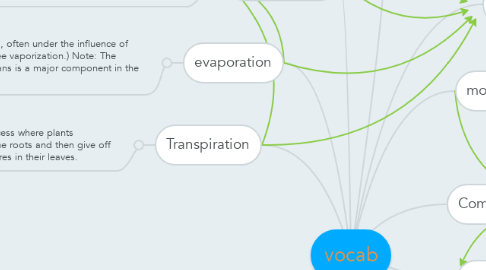vocab
by zeb smoyer

1. Inorganic Compounds
1.1. An inorganic compound is a compound that is considered not "organic". Inorganic compounds are traditionally viewed as being synthesized by the agency of geological systems.
2. Transpiration
2.1. Transpiration is the process where plants absorb water through the roots and then give off water vapor through pores in their leaves.
3. Precipitation
3.1. rain, snow, sleet, or hail that falls to the ground.
4. Condensation
4.1. Condensation is the change of water from its gaseous form (water vapor) into liquid water.
5. Organic Compounds
5.1. Organic compounds are molecules composed of carbon and hydrogen, and may contain any number of other elements.
6. evaporation
6.1. The changing of a liquid into a gas, often under the influence of heat (as in the boiling of water). (See vaporization.) Note: The evaporation of water from the oceans is a major component in the hydrologic cycle.
7. molecule
7.1. A molecule is the smallest particle in a chemical element or compound that has the chemical properties of that element or compound.
8. Compound
8.1. A chemical compound is an entity consisting of two or more different atoms which associate via chemical bonds.
9. Hydrocarbons
9.1. a hydrocarbon is an organic compound consisting entirely of hydrogen and carbon.
10. The Water Cycle
10.1. the cycle of processes by which water circulates between the earth's oceans, atmosphere, and land, involving precipitation as rain and snow, drainage in streams and rivers, and return to the atmosphere by evaporation and transpiration.


